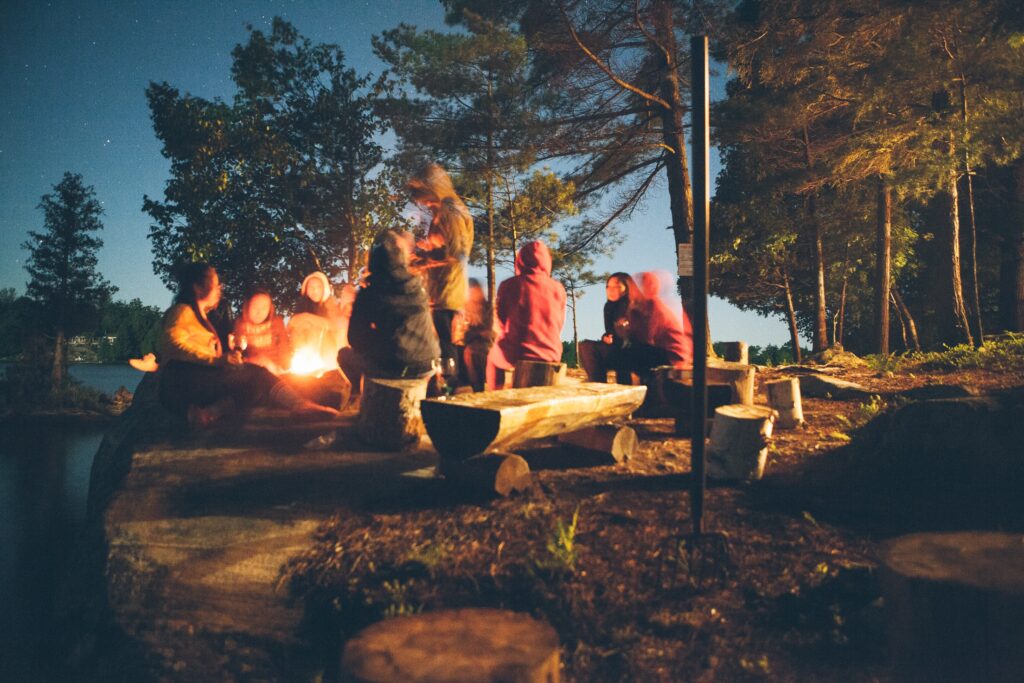Camping is an exciting and enjoyable way to explore the great outdoors, but it can also be dangerous if you don’t take the necessary safety precautions.
To ensure that you and your loved ones have a safe, enjoyable camping experience, it’s important to understand what steps you should take to stay safe while camping.
In this article, I’ll provide an overview of some basic camping safety tips that everyone should know before they set out on their trip.
Whether you’re a beginner or an experienced camper, it’s essential to be aware of the potential risks associated with camping and how to handle them.
From choosing a safe campsite to understanding basic first aid and survival skills, I’ll explain everything you need to know so that you can enjoy your next outdoor adventure with confidence.
Choosing A Safe Campsite
The first and most important step in camping safety is choosing the right campsite. Assessing terrain is essential; look for level ground with a slope away from your tent to prevent water from pooling.
Avoid flooding or other dangerous situations, like patches of snow that can create avalanche risks. Make sure you’re aware of any local wildlife and if they pose a threat.
Reading weather forecasts before you go is also highly recommended; this will give you an idea of what conditions you’ll be dealing with during your trip. Make sure the campsite isn’t prone to flooding or other extreme weather events, like heavy winds or lightning storms. Be aware of any local advisories regarding these risks as well.
In addition, it’s best practice to keep an eye on the sky while at the campsite — doing so can help you spot any potential danger early on. Even if you don’t expect inclement weather, it never hurts to be prepared for the worst-case scenario.
Taking these precautions will ensure a safe and enjoyable camping experience for everyone involved.
Understanding Basic First Aid And Survival Skills
Camping is an activity that can be both exhilarating and treacherous. From the moment you set off, you should be aware of the risks that come with such adventures. Understanding basic first aid and survival skills are essential in order to stay safe while enjoying the outdoors.
Dealing with injuries is always a primary concern when camping; even minor cuts or scrapes can quickly become infected if left untreated. Knowing how to properly clean and dress wounds can make all the difference in preventing further complications. It is also important to know how to recognize signs of shock and heat exhaustion, as well as any other medical issues that could require emergency attention.
Food storage is another important aspect of camping safety. Keeping food away from animals and sealed tightly in containers can help prevent contamination, as well as discourage unwanted visitors from visiting your campsite during the night. Additionally, it’s important to clean up after yourself to avoid attracting rodents or other critters looking for a meal.
Being prepared for the unexpected is key when it comes to camping safety – having a plan in place for any potential situation will give you peace of mind throughout your trip and help ensure you have a fun, safe experience in nature!
Stocking The Right Supplies And Equipment
Now that you have the knowledge of basic first aid and survival skills, it’s time to make sure you have the right supplies and equipment for your camping trip. Packing the essentials is key to a safe and fun experience.
Here are some must-haves:
* A tent or shelter
* Sleeping bags, blankets, and pillows
* Flashlights or lanterns
* First aid kit
When stocking up for your next camping adventure, remember to bring enough food and water for everyone in your party. Make sure to check expiration dates on all food items before packing them away.
You should also make a list of any other necessary items such as bug spray, sunscreen, and matches. Preparing ahead of time will help ensure you don’t forget anything important.
Additionally, it’s important to understand how to properly set up camp when you arrive at your destination. Researching the area beforehand can help you plan out where best to pitch your tent or shelter so that you can maximize safety and comfort during your stay. Knowing what natural hazards may exist in the area is also crucial so that you can take precautions against potential danger.
With these tips in mind, you’ll be ready for an enjoyable camping experience!
Practicing Fire Safety
When it comes to building campfires, safety is the top priority. It’s important to make sure that the fire is built in a safe area, away from flammable objects and sources of water. Make sure to always keep a bucket of water or a fire extinguisher nearby in case the fire gets out of control. If you plan on having an open-air fire, do not use accelerants such as gasoline or kerosene to start it.
Extinguishing your campfire is just as important as setting it up. Even if the flames seem extinguished, make sure that all embers are completely out before leaving the area. Do not pour gasoline on burning coals; instead, use sand or dirt to smother them until they stop glowing.
When you leave your campfire site, make sure there are no remaining hot spots and never leave any burning materials unattended.
It’s essential for campers to practice good fire safety habits when building and extinguishing fires. Having knowledge of proper campsite setup and fire maintenance will ensure that you have a safe camping experience without any dangerous accidents or incidents involving fire.
Being Aware Of The Local Wildlife
Planning a camping trip is an exciting way to explore the outdoors and experience nature, but it’s important to remember that you’re not alone.
Before embarking on your journey, it’s essential to be aware of any local wildlife in the area.
Take for instance the case of two hikers who were attacked by a bear while camping in Alaska.
They weren’t prepared for this encounter and had not done their research about local species or regulations.
This is why researching wildlife before your trip is so important – knowing what animals are around can help you stay safe and follow regulations such as whether or not firearms can be used in certain areas.
It also helps when preparing food or storing it securely away from your campsite so as to avoid attracting any unwanted guests!
Additionally, understanding animal behavior can help you identify signs of potential danger if you come across a wild animal.
Being familiar with the risks associated with different species will allow you to make informed decisions and enjoy your camping trip without putting yourself in unnecessary harm’s way.
Make sure to take time to understand what animals are native to the area and review relevant safety guidelines before setting out on your journey.
This simple step can go a long way towards ensuring an enjoyable experience while exploring the great outdoors!
Frequently Asked Questions
What Is The Best Way To Store Food While Camping To Avoid Attracting Wildlife?
When it comes to food storage while camping, the most important thing is to animal proof your campsite.
This can be done by storing food in sealed containers or coolers and keeping them away from any sleeping areas.
It’s also a good idea to hang any food bags off the ground, so that animals can’t access them.
Additionally, try to avoid leaving any food scraps or waste around your campsite as this can attract wildlife.
How Do I Know If I’m In A Safe Camping Area?
When it comes to camping safety, ‘better safe than sorry’ is an adage that rings true.
Before embarking on your trip, it’s important to research the area you plan to camp in.
Knowing the terrain and what supplies are necessary for the location will help ensure your safety.
Pack accordingly and take the necessary precautions to stay safe.
If you’re unsure about a particular area, contact local authorities or experienced campers for advice.
Are There Any Special Safety Tips For Camping With Children?
Camping with children can be a lot of fun, but it’s important to take into account their safety. Accidents can happen quickly when you’re outdoors, so preventing them is key.
Make sure to stay organized and have a plan for what you’ll do during the day or evening. Have supplies on hand in case of an emergency such as first aid kits, flashlights, and extra water.
Also make sure that everyone wears protective clothing like hats and long-sleeved shirts, as well as sunscreen and insect repellent if necessary.
Finally, be aware of any hazards in your area such as sharp objects, poisonous plants or animals, etc., and ensure that all children are supervised at all times.
By taking these steps you can ensure that your camping trip is safe and enjoyable for the whole family!
What Is The Best Way To Dispose Of Waste While Camping?
When packing for your camping trip, make sure you bring the necessary supplies to properly dispose of your waste.
For example, when we took our family camping recently, we made sure to bring along a shovel, some garbage bags, and a fire proof container for ashes from the campfire.
This not only helps you keep the campsite clean but also prevents any potential harm to kids and animals.
Additionally, proper disposal of trash can help prevent wildfires as well as the spread of disease.
Make sure to follow all fire safety guidelines too; this means dousing the campfire with water and stirring up the ashes before leaving it completely unattended.
With these simple tips in mind, you can rest assured that your camping trip will be safe and enjoyable for everyone!
What Should I Do If I Encounter A Dangerous Animal While Camping?
To ensure a safe and enjoyable camping trip, it is important to prepare ahead of time in case you encounter any dangerous wildlife.
Respect the wildlife around you and remember that they are more scared of you than you are of them.
If you do come across a dangerous animal, remain calm and slowly move away from it.
Avoid making direct eye contact or sudden movements as this can provoke aggressive behavior.
Never attempt to feed any wild animals as this could lead to unwanted conflict.
By taking these precautions, you will be able to enjoy your camping trip without incident.
Conclusion
Camping is a great way to get outside and explore the wonders of nature. It can also be dangerous if you don’t know how to stay safe.
Preparation is key for a successful camping trip, so make sure you are aware of everything you need to know before setting off.
It’s essential to store food properly, choose a safe campground, have appropriate safety measures in place when camping with children, and learn how to handle waste and dangerous animals.
By following these tips and being mindful of your surroundings while camping, you can make the most of your trip without putting yourself or others at risk.
Remember, “An ounce of prevention is worth a pound of cure!”
- Best Camping Sites In India - May 28, 2023
- 10 Essential Items For A Comfortable Camping Trip - May 4, 2023
- The Best Camping Tents For Families - May 4, 2023

